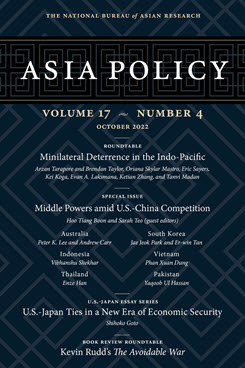Essay in Asia Policy 17.4
South Korea’s Investment in the U.S.-ROK Alliance
A Case Study of the New Southern Policy
This essay argues that South Korea’s deliberate efforts to find nexuses between its New Southern Policy (NSP) and the U.S. Indo-Pacific Strategy is an investment in insurance for the U.S.-ROK alliance.
EXECUTIVE SUMMARY
MAIN ARGUMENT
South Korea has been exploring connections between its NSP and the U.S. Indo-Pacific Strategy at the request of, if not pressure from, the U.S. South Korea has expanded the NSP’s scope to include nontraditional security and target areas in the South Pacific. This policy choice is, in part, an investment in insurance for the U.S.-ROK alliance to bolster the partnership and ensure a U.S. security commitment to the Korean Peninsula. Were South Korea not to accommodate the U.S. strategy, Washington might reduce its commitment to the alliance in response. However, adjusting to some elements of the U.S. Indo-Pacific Strategy also gives South Korea leeway to engage more with China without causing the perception that it is strategically tilting toward China.
POLICY IMPLICATIONS
- As the U.S. and South Korea increase their cooperation for infrastructure investment in Southeast Asia, South Asia, and the Pacific Islands, South Korea should demonstrate its interest in coordinating in minilateral settings with Japan, Australia, and India. Doing so would create greater space for South Korea to also participate in China’s Belt and Road Initiative more broadly without causing the U.S. to misperceive that South Korea is tilting toward China.
- Enhancing cooperation with the Quad states in regional maritime security can give South Korea more room to engage with China in responding to regional nontraditional security issues.
Jae Jeok Park is an Associate Professor at Hankuk University of Foreign Studies in Seoul (South Korea). Previously, he was a visiting professor at the Institute of Foreign Affairs and National Security and a research fellow at the Korea Institute for National Unification.
Er-win Tan holds the position of Associate Professor at Hankuk University of Foreign Studies in Seoul (South Korea). His research interests include security dilemma theory, security and diplomacy in the Indo-Pacific, inter-Korean relations, nuclear proliferation, hybrid warfare, geostrategy, and strategic culture.
About Asia Policy
Asia Policy is a peer-reviewed scholarly journal presenting policy-relevant academic research on the Asia-Pacific that draws clear and concise conclusions useful to today’s policymakers. Asia Policy is published quarterly in January, April, July, and October and accepts submissions on a rolling basis. Learn more


